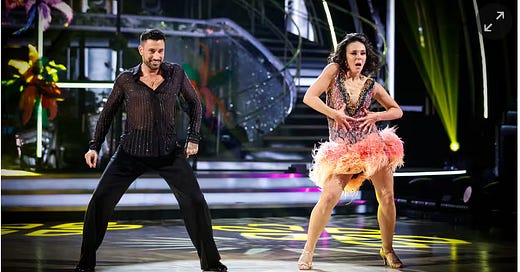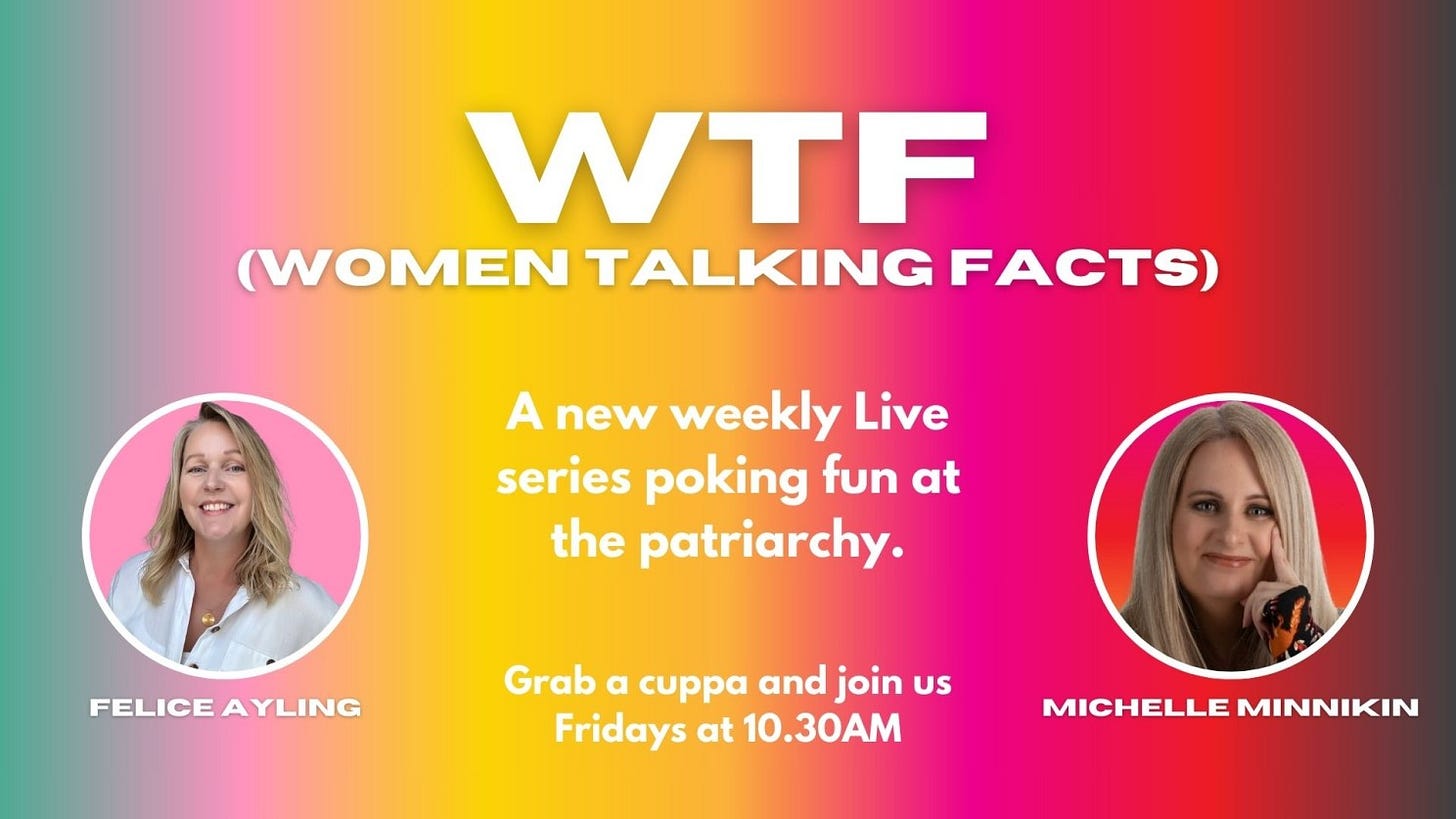Reading about Amanda Abbington’s experience and the backlash she faced made me feel physically sick - and angry. Not at the men who jumped in with their usual comments of “you’re just too sensitive” or “get over it,” but at the sheer volume of women who turned against her. Why do we see this pattern of women attacking other women so viciously? And more importantly, how can we change this narrative?
For context: Amanda Abbington, an actress and vocal advocate, recently spoke out about feeling uncomfortable during rehearsals of the UK reality TV show Strictly Come Dancing. She expressed concerns about being touched and moved without consent, verbal bullying and harassment. However, her courage in speaking up was met with an unexpected response: widespread backlash from other women.
Things escalated further this week when the BBC issued a formal apology to Amanda after an official complaint revealed that her boundaries had indeed been disregarded by her professional dance partner, Giovanni Pernice. This should have been a moment of vindication for Amanda, but instead, it added fuel to the fire of online vitriol, much of it led by women who felt she should have kept quiet or “toughened up.”
Speaking up is never easy for women - especially in a world that has historically conditioned us to stay silent, agreeable, and accommodating. When women voice concerns, whether in the workplace or in personal situations, they risk being dismissed, ridiculed, or even ostracised.
Fear of backlash, not being believed, or being labelled as "difficult" or "emotional" can keep many women from raising their voices. It’s exhausting and isolating to navigate these barriers alone. And when other women, often driven by internalised misogyny, join in silencing or shaming those who do speak up, it reinforces the dangerous notion that a woman’s voice is less valuable. But speaking up, even when it’s hard, is the first step towards reclaiming power and creating a more equitable society for all of us.
Misogyny Isn’t Just a Male Domain
Here’s the thing: misogyny isn’t just a behaviour exhibited by men. Women can be deeply misogynistic too. It’s a hard pill to swallow, but true nonetheless. Misogyny is ingrained in all of us from birth, and it influences how we perceive and interact with each other as women. We’ve been conditioned to believe that there’s only room for a select few at the top, so we end up tearing each other down, rather than building each other up.
In my book, Good Girl Deprogramming, I explore the concept of “Good Girl Conditioning” and how it primes women to fit into patriarchal structures without realising it. This conditioning can also lead to what is called “horizontal violence” - when women turn on other women, enforcing the same oppressive standards and narratives that limit us all. We’re conditioned to uphold the status quo and keep other women in check, which means that when one woman steps out of line, others rush in to pull her back.
The Real Harm of “Policing” Other Women
Amanda Abbington’s experience isn’t unique. Women who dare to voice discomfort, set boundaries, or call out inappropriate behaviour often find themselves on the receiving end of criticism from other women. I’ve seen this happen repeatedly: whether it’s a woman complaining about unfair treatment at work or discussing issues like the gender pay gap, there’s a group of women who are quick to minimise the experience, shame them, or outright attack them.
Why? Because it’s safer to attack the woman speaking up than it is to face the larger, scarier problem of systemic sexism. It’s easier to conform to the idea that “she’s just being dramatic” than to confront the uncomfortable reality that things aren’t fair, that boundaries are constantly crossed, and that speaking up can have consequences. It’s a survival tactic - a way to protect oneself by showing that you are the “good girl” who doesn’t complain and who won’t disrupt the social order.
Misogyny in the Form of “It’s Not That Bad”
I’ve encountered this countless times in my own life and work. Women who dismiss other women’s stories of harassment or discrimination by saying things like, “Oh, I’ve experienced worse,” or “It’s just how it is, we need to toughen up.” This reaction stems from the belief that if we can endure it, we’re stronger, more capable, and somehow more deserving of respect. But this mentality is toxic - it’s a form of gaslighting that denies women their own experiences and forces them to shrink themselves even further.
It also perpetuates the myth that women should simply accept inappropriate behaviour because “that’s just how it is.” This kind of thinking is what keeps us locked into cycles of silence, shame, and oppression. And it’s particularly damaging when it comes from other women, because it feels like a betrayal of the sisterhood we so desperately need.
How to Overcome Internalised Misogyny
If we want to stop perpetuating this damaging cycle, we must start by acknowledging and working on our own internalised misogyny. Here are three practical tips to help you change the narrative:
1. Recognise and Reflect on Your Reactions
Internalised misogyny often shows up in our automatic responses to other women’s behaviours or choices. Notice when you feel triggered, annoyed, or judgmental towards another woman. Ask yourself:
Why do I feel this way?
Is this reaction coming from my personal values, or have I been conditioned to think negatively about women who don’t conform?
What is it about this woman’s behaviour that I don’t allow in myself?
Reflecting on these questions can help you identify biases and patterns in your thinking that might stem from internalised beliefs.
2. Challenge and Reframe Stereotypical Beliefs
Catch yourself when you make assumptions about women based on stereotypes. This could be thoughts like, “She’s too emotional,” or “Why is she so ambitious?” Actively challenge these thoughts by considering the opposite perspective. Instead of assuming, reframe with positive alternatives:
Is she being emotional (and if she is, why is that bad?!), or is she being passionate?
Is she ambitious (again, what is wrong with this?!), or is she just confidently pursuing her goals?
This helps shift from negative conditioning to a mindset that values women’s diverse expressions and strengths.
3. Speak Up and Stand in Solidarity
When you hear other people (women included) engaging in conversations that put down women or enforce gender stereotypes, make it a point to speak up. This doesn’t have to be confrontational, but you can use questions like:
Why do you feel that way?
Would we say the same thing if a man did it?
By gently challenging these narratives, you not only address internalised misogyny in yourself but also contribute to changing the perceptions of those around you.
Why We Need to Talk About It - and Flipping Change It
When women attack other women, we’re not just harming the person in front of us. We’re harming ourselves and the entire movement toward gender equality. We’re reinforcing the idea that women should sit down, shut up, and smile politely no matter what happens to them.
Amanda Abbington was brave enough to speak up, and she shouldn’t have to backtrack or justify herself for doing so. The BBC’s apology to her was a step in the right direction, but it shouldn’t take an official complaint to validate a woman’s discomfort and boundaries. We, as women, need to do better. We need to recognise our own internalised misogyny and actively work to unlearn it. That means listening to each other, supporting each other’s boundaries, and understanding that every woman’s experience is valid, even if it doesn’t mirror our own.
This isn’t just about Amanda Abbington. It’s about all of us and the culture we’re creating for our daughters, sisters, and friends. We need to challenge our own conditioning and stop being agents of the very system that oppresses us.
A Call to Action: Let’s Be Better Allies
So, next time you see a woman speak up - whether it’s about discomfort at work, an issue with sexism, or just drawing a boundary - pause before you judge. Ask yourself: is your reaction rooted in solidarity or in internalised misogyny? Are you reinforcing the patriarchy, or are you supporting your fellow woman in claiming her space and her voice?
We need to do better.
Read more on Amanda Abbington’s experience in this Guardian article.
And What Else is Happening?
1. Good Girl Deprogramming Podcast
Meet Felice Ayling, the dynamic force behind Loud Women, where she empowers female founders to not just make a mark but to make a meteor-sized impact. With a flair for shaking things up, her mission is to help bold, driven women like you unleash the full potential of your business with confidence and style.
We’re calling it our “Emergency Podcast” because, honestly, September has been a tough month for women everywhere. Trauma, tragedy, and societal pushback have been hitting us hard. 💔
💬 We discuss the silent majority of men - those who see themselves as the “good guys” simply because they’re not actively harming women. But is that really enough?
Here it is on YouTube. You'll find it on all the other podcasting platforms too!
2. WTF (Women Talking Facts)
Felice Ayling MCIM and I had our first Friday LinkedIn Live series called WTF - Women Talking Facts. You can watch it on the replay here.
We’ll have another on Friday, who will be named cretin of the week this week? - watch this space.
ALSO - Felice is hosting an event called - “How to Deal With Dickheads Online” - see you there?
3. Good Girl Deprogramming’s First Birthday!
I can’t quite believe that we’re almost a year since the book was released. And what a rollercoaster this year has been.
To celebrate I’m holding a virtual birthday party on Thursday 21st November at 7pm (UK Time). I would love to see you there! Here’s the link to register.
That's all from me this week!
Take care,
Mx







Women absorbing the misogyny and passing it along to other women is something I see in such distressing abundance with this Trump vs. Kamala campaign cycle (and the right wing in general). WOMEN have told me at work, in a progressively democrat-run local town hall by the way, that they aren't voting for K-mal because they "don't like her voice." Someone else said she isn't qualified. Not to mention all the anti-female policies they are signing on for... Sigh. So confusing.